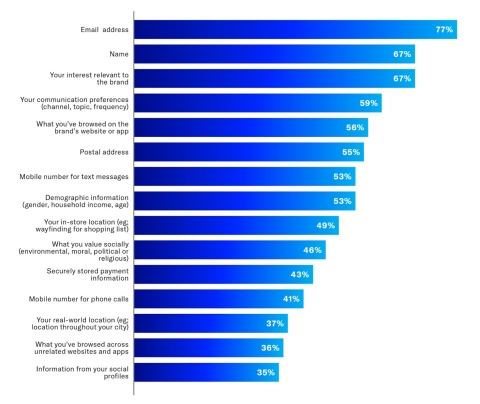
Business Wire India
Increasing data privacy regulations and changes from Apple and Android give consumers greater transparency and control over the personal information they share with brands, which predictably is resulting in the demise of third-party data. To help companies transition to direct customer relationships where first-party and zero-party data improve customer understanding and provide more opportunity to create greater mutual benefit, the mobile app experience company Airship today published a report, “The Mobile Customer Imperative.” Based on a survey of more than 9,000 consumers across seven countries, including the U.S., U.K., France, Germany, Australia, Singapore and India, the report spotlights new consumer behaviors and expectations for digital communications along with recommendations for how companies can gain greater value while enhancing the customer experience.
This press release features multimedia. View the full release here: https://www.businesswire.com/news/home/20211208005365/en/

Information consumers are willing to share with brands for personalized interactions and special incentives (Graphic: Business Wire)
A few key findings include:
- More than three-quarters of consumers (78%) ignore or delete emails from brands they’ve subscribed to half of the time or more. Younger generations are more likely to rarely check their email as well as use anonymous or fake email addresses
- Consumers are least likely to share information from their social profiles across 15 types of information, but many more will share their social values relating to environmental, moral, political and religious views
- “Personalized offers based on behaviors” is one of the least likely motivators for consumers to opt in to smartphone communications, though “information not relevant/personalized to my needs” is the second most common reason for opting out
- More than half of U.S. consumers (52%) will share their mobile phone number for text messages, but only 37% will share it for phone calls
Survey results show a strong and growing consumer preference for mobile apps, with most app categories trending towards 75% of respondents using them more or about the same since the pandemic began — highlighting the opportunity to establish positive feedback loops between brands and customers. Now, brands are better able to engage customers wherever they are, while app users benefit from sharing their preferences and affinities for more personalized service, with greater control over their data and the ability to easily shut down brands that aren’t meeting their needs.
The full report is available for download here, with details on regional and generational splits across the following topics:
- The reasons consumers opt in or out of brand communications
- Consumer preferences regarding the timing and frequency of receiving brand messages
- What personal information consumers are willing to share with brands, and for what reasons
- Why and how consumers are increasingly ignoring emails from brands
- Consumer demand to meld digital and physical experiences.
Considered together, these topics offer a more nuanced understanding of consumer behaviors and expectations. For example, while “personalized offers based on behavior/past purchases'' doesn't motivate the initial opt-in, both “interests relevant to a brand” and “what they’ve browsed on a brand’s app or website” are among the top five items consumers are willing to share with brands for personalized interactions and special incentives. In addition, more than 40% of respondents are more likely to continue receiving brand communications if they are given controls over purpose, frequency and channel of communication. These specific preferences are the fourth-most-likely item consumers are willing to share with brands — ahead of more traditional information like postal address or demographics.
“Data privacy remains a key issue for consumers. Companies must go far beyond targeting ‘eyeballs’ and delivering one-way messaging and brand-centric campaigns to succeed in the customer-first digital future,” said Brett Caine, CEO and president, Airship. “To gain the insights necessary to meet today’s expectations, brands must provide a more robust mobile app experience with individualized control to reach much deeper into the hearts and minds of their customers.”
Methodology
The survey was conducted by Sapio Research on behalf of Airship in September 2021. Respondents included 9,143 consumers in seven countries who were asked a variety of questions about their experiences, expectations and desires in interacting with brands digitally. At an overall level, the survey’s results are accurate to ±1% at 95% confidence level.
About Airship
No one knows more, does more, or cares more when it comes to helping brands master mobile app experiences than Airship. From the beginning of apps, we powered the first commercial messages and then expanded our data-led approach to all re-engagement channels (mobile wallet, SMS, email), app UX experimentation, proactive in-app conversations and now rich in-app experiences that business users can create and adapt on their own — with no ongoing developer support or app update required.
From the trillions of mobile app interactions we’ve powered for thousands of global brands, we’ve been there, and done that, lending our solutions and expertise to help apps become the pinnacle of elegant customer experiences and winning brand loyalty strategies.
For more information, visit www.airship.com, read our blog or follow us on Twitter, LinkedIn and Facebook.
View source version on businesswire.com: https://www.businesswire.com/news/home/20211208005365/en/








 IndianWeb2.com is an independent digital media platform for business, entrepreneurship, science, technology, startups, gadgets and climate change news & reviews.
IndianWeb2.com is an independent digital media platform for business, entrepreneurship, science, technology, startups, gadgets and climate change news & reviews.
No comments
Post a Comment